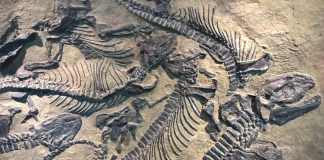In 1842, an English biologist named Sir Richard Owen coined the term “dinosaurs,” a name that means “terrible lizard.” This name was a combination of two words burrowed from the Greek language: deinos–a name that means “terrible” and “saurus”—which means lizard. Since that time, all kinds of interesting names have been given to the various dinosaurs discovered. Most of them derived from Greek and Latin words, but also sometimes from words from other languages, physical locations of where the dinosaurs were found or the people who discovered the dinosaurs or contributed to the field of paleontology.
While there just isn’t enough space here to list all the dinosaur names that exist, there are some interesting ones that I would like to talk about. For instance, Baryonyx means heavy claw. Corythosaurus means helmet lizard and Homalocephale means flat head. These are all named after physical characteristics that each of these dinosaur’s possessed. However, not all dinosaurs were named after the dinosaur’s physical characteristics. Some were named after places: Albertosaurus (after Alberta, Canada) and Lesothosaurus (after Lesothosaurus, South Africa) are prime examples. Other types of dinosaurs were named after people—either ones who discovered them or contributed greatly to the field. For example, the dinosaur “Drinker” was named after Edwin Drinker Cope and the dinosaur Marshosaurus was named after Othniel Charles Marsh.
If you are wondering how the names of dinosaurs are constructed from their root words, then please read on because we are going to cover a little crash course on the subject. For instance, “tri” means three in Latin, “cerat” means horn in Greek and “ops” means face in Greek. Combine those three together and you have triceratops. The name of dinosaur Stegosaurus can be broken down into “stego” which means covered or roof, and “saurus” which means lizard. Combine these and you can see that it means “roofed or covered lizard”; An apt name for their spike covered bodies. See how easy that can be?
Below are some other popular roots used for the names of dinosaurs. These will help you as you attempt to identify some of the more common ones. These will allow you to try your hand at figuring out what some of the dino names mean.
- Dino: from the Greek Deinos – means Terrible
- Draco: From the Greek Rakon – means Dragon
- Hippos: From the Greek Hippos – means Horse
- Hydro: from the Greek – means Water
- Ortho: from the Greek Orthos – means Straight
- Macro: from the Greek Makros – means Large
- Micro: from the Greek Mikros – means Small
- Mega: from the Greek Megas – means Huge
- Morph: from the Greek Morph – means Shape
- Poly: from the Greek Polys – means Many



























